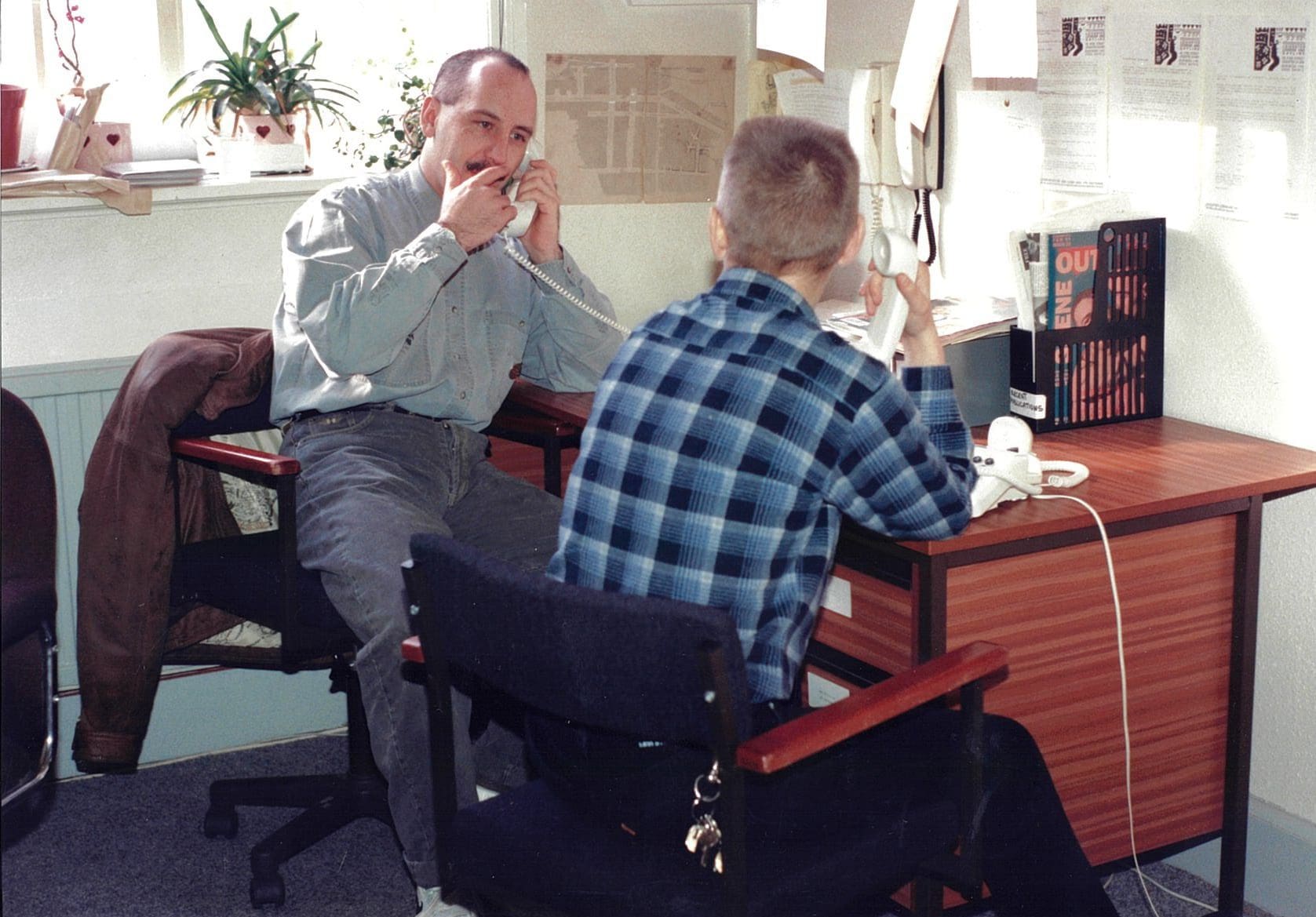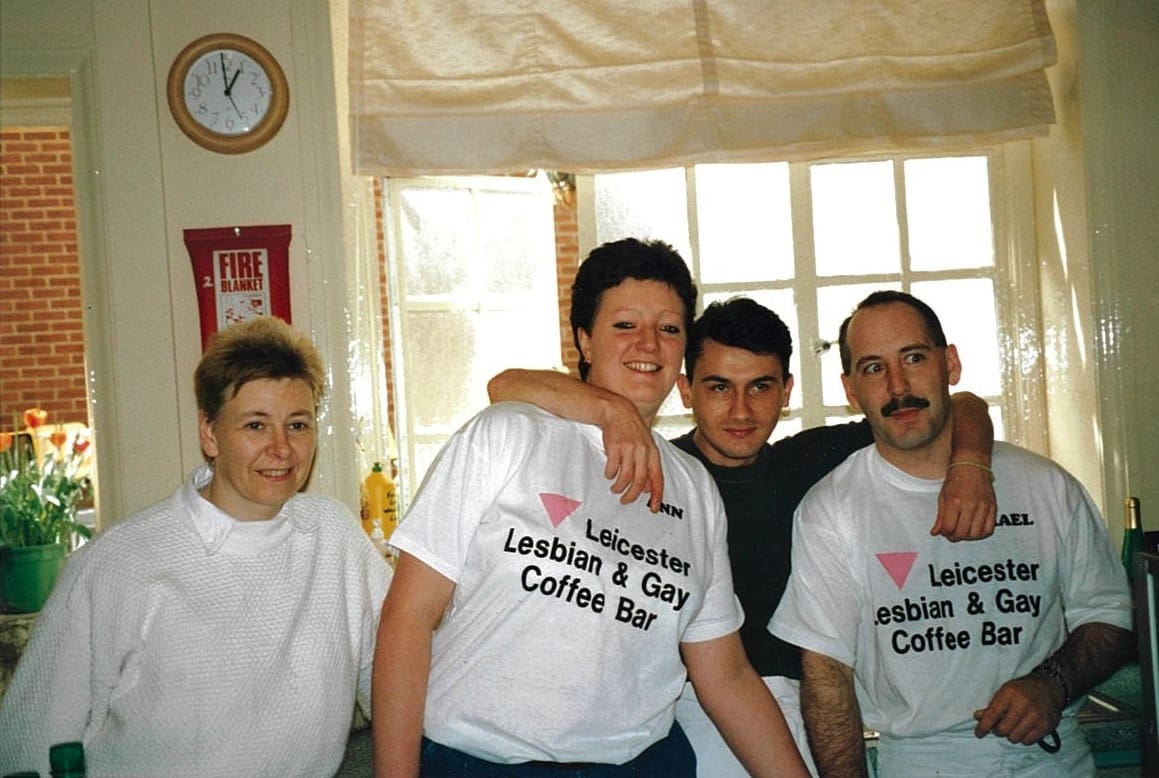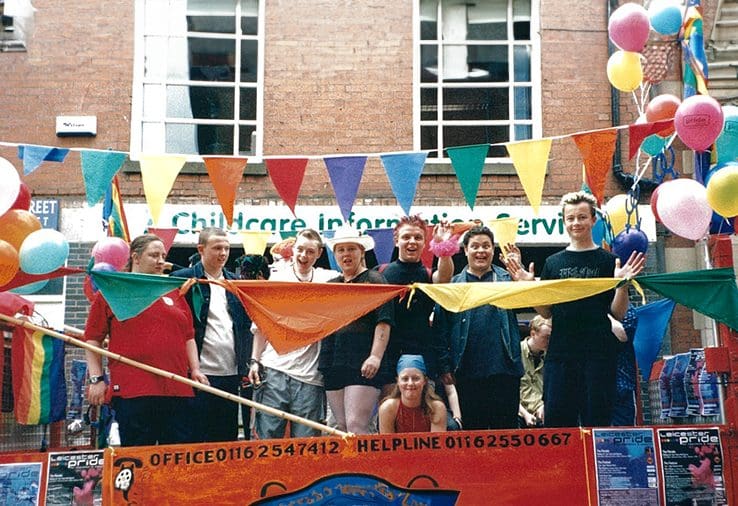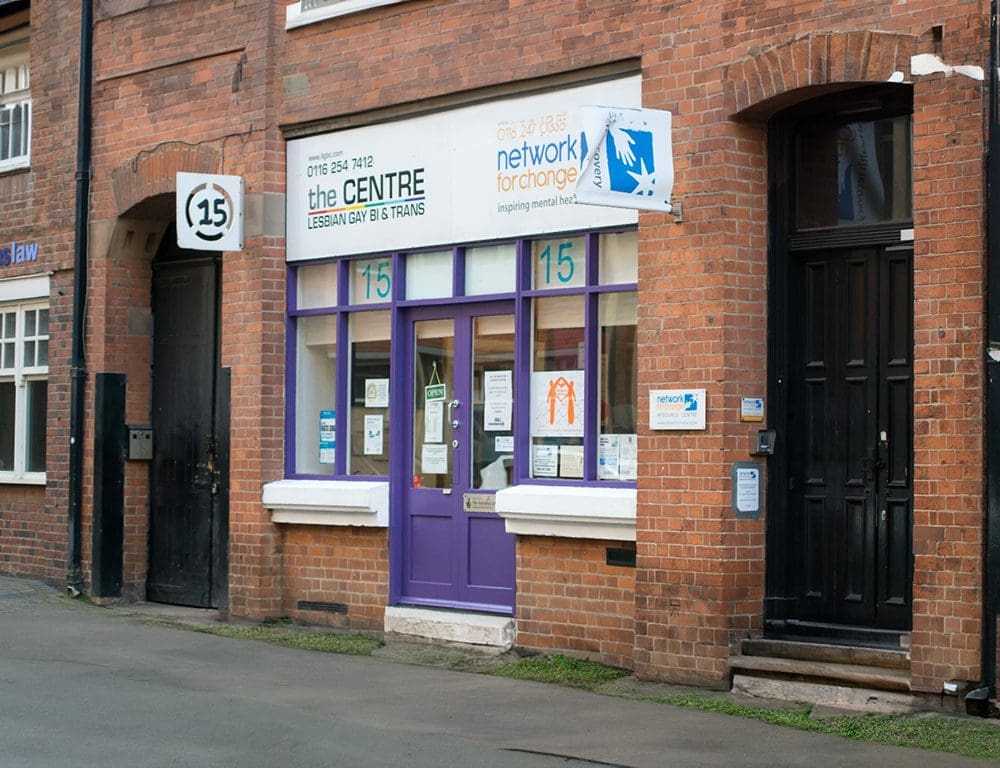Gayline was one of the first LGBT telephone helplines outside of London.
We were the first LGBT organisation to obtain television advertising.
We were the first LGBT organisation in England and Wales to receive Central Government Funding.
We pioneered a hate crime initiative that influenced others nationally, originating from the LGBT community in Leicester.
We believe we are the longest continuous running LGBT project with its own premises and staff in the UK.
the HISTORY OF THE LEICESTERSHIRE LGBTQ+ CENTRE

1970’s
The Beginning



26 September 1976
Gayline was established
Gayline emerged from a meeting at Vaughan College to discuss the challenges faced by young homosexual men. Mike Clutten and Terry Drummond identified the need for a support system and initiated the idea of a telephone hotline, which Mike took forward. Around the same time, Patrick Micel contacted Gary Milner, convenor of the Leicester Campaign for Homosexual Equality, about starting a counselling service for gay individuals.
These two initiatives came together on 26 September 1976, at a meeting at Patrick’s house on Narborough Road South, attended by 15 people. From the outset, Gayline was run entirely by seven volunteers (six men and one woman, Wendy Harrison) from the front room of Patrick’s house. There was no formal structure, just a few simple rules:
• Volunteers must self-identify as gay
• Calls were never to be hung up on
• No sexual relationships were to occur with callers
In its first year, Gayline answered 345 calls and was privately funded by its members. The group’s total income was £25, with expenses of £24.33. Monday nights were reserved for women’s calls, answered by Wendy, while Tuesday nights were designated for those under 21, with a young person fielding calls. Gayline advertised through leaflets and Gay News.
September 1977
The Leicester Mercury refused to advertise Gayline’s services, since it was established. This sparked the largest gay rights demonstration Leicester had seen at the time. Geoff Martin and Patrick Micel organized a petition and led a march to the Mercury building, supported by the Gay Liberation Front and the National Union of Journalists.
Despite this, Gayline found success advertising with the Leicester Trader, and also creatively used stickers on items like banknotes to spread awareness.
September 1979
Gayline moved and began operating from Geoff Martin and Steve Bamlett’s house on Danvers Road, answering calls Monday – Friday between the hours of 7.30pm – 10.30pm.
1980’s









1980
Gayline relocated to a private house on Wolverton Road, owned by Bernard Greaves. It also established connections with the Leicestershire Police, assisting in tracing missing young people, though this relationship ended in 1984 due to a breach of trust.
Additionally, the first youth group was formed, and women were recruited into the collective to achieve gender balance. Between 1980 and 1983, Gayline’s phone was tapped by police, an issue that was resolved with the intervention of MP Greville Janner.
1981
They raised additional funds through hosting discos, sponsored walks, and private donations.
1983
Gayline hosted the first Conference for Lesbian and Gay phonelines, on behalf of national organization ‘Friends’, joining their network. At this point Gayline was the only phoneline with equal numbers of men and women in the collective and had the widest social background.
April 1983
Gayline aired their first ATV Public Service Announcement – the first by any LGBT organisation in the UK.. In the 12 months before the PSA, gayline received 683 calls. In the 6 weeks after the PSA, Gayline received 2,200 calls, which grew to over 10,000 within 12 months.
1984
The Gay Action Group was established to handle political activism, allowing Gayline to focus on support services. Gayline received government funding for the first time through the ‘Opportunities for Volunteering’ fund, allowing it to purchase its first premises. They were the first LGB organisation to receive central government funding. This funding was controversially challenged by MP Peter Bruinvels at the Conservative Party Conference, but was ultimately defended by Health Minister Kenneth Clarke.
1985
Gayline leased premises at 45 King Street and moved in after extensive volunteer- led refurbishments, becoming the first service-led lesbian and gay center outside London.
1985
The first unofficial Leicester Pride was held in Town Hall Square, organized in part by members of Gayline, Linda Grant and Warren Wiesner. The event was a success despite the council’s opposition, and they even attempted to turn the Town Hall fountain pink!
1986
Gayline received its first partial funding from Leicester City Council for equalities work. The first official Leicester Pride event was recognised by the council, with prominent local politicians, including Keith Vaz and Peter Soulsby, in attendance.
1987
Gayline initiated and led an HIV/AIDS working party within the council and produced a report on the impact of Section 28 of the Local Government Bill, which was cited serval times during House of Lords debates. With funding from the City Council, Gayline provided support services for those impacted by HIV/AIDS.
1988
Gayline changed its name to Leicester Lesbian and Gayline and received funding from the Public Health Department at the City Council to hire its first full-time employee by the end of the year.
1990’s









c.1990
Leicester Lesbian and Gayline changed its name to ‘Leicester Lesbian and Gay Centre’.
1990
The First Out Youth Group was started by Katy Wright and Sue Flahey, growing to 20-30 regular attendees.
1991
With Jill Parker as Centre Manager, a cafe was opened at the premises on King Street serving good quality food on Friday’s and Saturday’s. This expanded to include a Wednesday women’s coffee bar, alongside readings and book talks by prominent LGBT activists and academics.
1993
The Centre continued their work to support and advocate for those living with HIV/AIDS, working closely with Leicestershire Aids Support Services. The Centre also worked with the Black MESMAC project, who provided training for helpline volunteers in racism and homophobia.
There was a busy programme of activities, including the lesbian parents group.
September 1993
The Centre pioneered a hate crime reporting service in collaboration with Leicestershire Police.
1994
The Centre received funding from both the City and County Council, in addition to the Health Authority despite Section 28 legislation. The Health Authority funding was used to support training for volunteers and centre users in British Sign Language by a Deaf Gay Man.
1996
The Centre received a National Lottery Grant, employing eight staff members and 20 volunteers. Fee Scott took over as Centre Manager.
1997
The Centre moved to 15 Wellington Street with continued lottery funding. A café was located the ground floor, which offered an informal meeting place and a women’s night was hosted there on Fridays once a month.
The Centre Changed its name to the Leicester Lesbian, Gay, and Bisexual Centre, recognizing the long-running contribution that bisexual people had made to the Centre.
1999
A women’s bar was opened on a Friday night, as the Centre became a licensed premise, addressing the lack of spaces that were aimed at lesbian and bisexual women by commercial offerings in the city.
2000’s









2000
Trade Sexual Health, a project originally based at the Centre, became a separate organization focused on the LGBTQ+ community’s sexual health.
2004
The Centre secured funding to conduct the largest-ever survey of local LGB communities, titled ‘Sexyouality Matters’, led by Centre Manager David Graham.
2006
‘The Health and Social Care Needs of Lesbian, Gay, and Bisexual people in Leicester’ research report was published, which took forward the findings from the ‘Sexyouality Matters’ Survey.
2007
The Centre used these reports to secure Big Lottery funding, which enabled the Centre to employ two full time paid staff to develop the health and care needs of Leicester’s LGBT population. This was a dynamic period in the Centre’s history in terms of engagement with public, voluntary and private sector bodies, bolstered by the Equality Act (Sexual Orientation) Regulations 2007 and Equality Act 2010.
5 June 2008
The Centre organised ‘A Life in A Day’ Conference, held at Leicester City Football Club, to help employers learn practical ways of tackling prejudice and ensuring services were welcoming to all. The day including an opening address by Sir Peter Soulsby, talks by Professor Julie Fish, Linda Bellos OBE, and Christine Burns MBE.
2008
The Centre collaborated with Leicester City NHS to produce ‘In the Pink: Providing Excellent Care for Lesbian, Gay, and Bisexual People’, a practical guide for GPS and health practitioners, and ‘How to Make Services LGBT Friendly: 30 Practical Ways to Create a Welcoming Environment for Lesbian, Gay, Bisexual, and Transgender People’.
2010
The Centre became a charity and was renamed the Leicester LGBT Centre, reflecting the inclusion and support of the transgender community.
2010’s









2010 – 2015
The Centre was funded by the Heritage Lottery Fund to run the Leicester LGBT Oral History Project, ‘Untold Stories’. More than 100 people were interviewed as part of this project, 20 volunteers received training to conduct oral history interviews and the resulting exhibition attracted more than 1,000 people in three months. At the time, it was thought to be the largest LGBT oral history project in the UK. The project also resulted in a book, called ‘Untold Stories’ by Bernard Greaves.
2012
The Leicester Partnership Trust and De Monfort University collaborated on a project around LGBT mental health. The evidence provided by the project, resulted in a discrete service for LGBT people in mental distress, based at the Leicester LGBT Centre. Uniquely, the service allowed self-referral so that service users did not need to disclose their sexual orientation or gender identity to their GP in order to access therapeutic support.
2013
The Centre contributed to a new LGBT psychological therapies service launched by NHS in Leicester and hosted an open day at the Centre around the theme of Health and Well Being. Peter Tatchell was a guest speaker, and many NHS organizations attended.
2014
The Centre received funding from De Montfort University.
2015 – 2019
With funding from BBC Children in Need, the Centre launched the Young Transgender Centre of Excellence, which provided support services for young transgender individuals, their families, and professionals. The YTCS gained national recognition from the Government.
2016
The Centre hosted the ‘Taking Pride’ Conference at De Montfort University, with workshops the health and wellbeing of older LGBT people and young transgender people.
2017 – 2021
Building on the success of the youth program, the Centre established the Adult Trans Project with funding from the National Lottery, offering support to transgender and gender-questioning adults and their loved ones across Leicester, Leicestershire, and Rutland. Our work to support the trans community across Leicestershire and Rutland continues.
2018
Pride without borders was set up to support LGBTQ+ Asylum Seekers.
2020’s
& BEYOND!









April 2023
After more than 25 years at 15 Wellington Street, the Centre moved to the Voluntary Action Leicestershire building on Newarke Street.
November 2024
The Centre was renamed the Leicestershire LGBTQ+ Centre, reaffirming its commitment to serving LGBTQ+ individuals throughout the county and Rutland. This change reflects our dedication to supporting the diverse needs of the entire LGBTQ+ community, while also continuing to learn, evolve, and grow alongside those we serve.
We remain committed to fostering inclusion and advocating for progress, ensuring that our services adapt and expand in line with the community’s needs and experiences.

